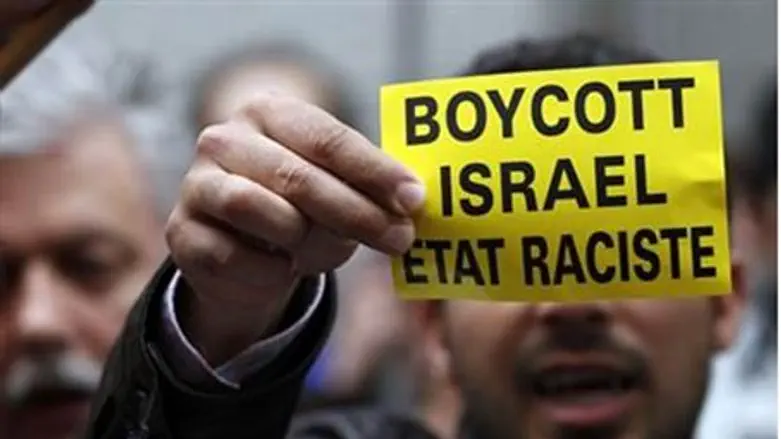
EU member states have been readying themselves to enforce sanctions on Israel for Jewish communities in Judea-Samaria, diplomats revealed Tuesday - and will strike hours after the March 17 elections.
Israeli officials in recent weeks met with Europe's most important foreign ministries at the EU headquarters in Brussels, an Israeli official told Walla! News on condition of anonymity, and said that the planned measures in Europe will be focused on "the illegality of the settlements under international la" - without any distinction between "settlement blocs" generally agreed upon to remain in Israel and isolated communities.
"The guiding principle is their deepening and emphasizing the absolute difference they make between Israel within the Green Line and Israel beyond the Green Line," the official said, referring to the 1949 Armistice lines. "They talks about sanctions against companies that do business across the border, to support legal action of the Palestinians over the settlements and the renewal of the proposal for the establishment of a Palestinian state through the UN Security Council."
"The assumption is in Europe that a right-wing government will be elected in Israel, and thus it would be easier to promote these measures" against it, the official added.
Part of the sanctions include measures exposed by Haaretz in November; all of them are agreed upon by major EU players, the official emphasized.
"This is not something that a group of junior officials has been advancing in discussions off to the side," the official insisted. "It's a process that has been shared by all the EU countries and that has been allowed to advance by senior officials in Brussels."
"The elections were able to delay the process, for two reasons - partially because they [the EU] do not want to be seen as interfering, and partially because some countries hope that after the elections there will be a chance to resume negotiations with the Palestinians," the official added. "However, at the moment, it doesn't look like that will happen, so they are readying the sanctions now."
The issue of European sanctions and international pressure on Israel has not become a major issue in the current election campaign, but in Jerusalem, officials are well aware of the dangers that lurk for Israel after the elections.
Foreign Minister Avigdor Liberman said in closed conversations in recent months that Israel is expecting to face a very difficult period in the international arena by the end of elections, and that prominent countries in Europe are working together with the Palestinians on the subject.
A senior European diplomat assured Walla! that "no new steps will be revealed before elections in Israel" and that EU countries have been "very careful not to intervene."
He added that "Israelis have known for some time what we are planning."
The EU has a long history of pressuring Israel over "illegal settlement activity" in Jewish-owned areas of Judea and Samaria, which was declared legal by international law in the 2012 Levy Report.
Despite this, an explosive expose by watchdog groups revealed last week that the EU is funding illegal settlement in Judea-Samaria - by assisting the Palestinian Authority (PA) and pro-Palestinian groups in illegally grabbing land from Israel's area, Area C.
Overall, the bloc has threatened Israel multiple times to further its agenda in the Middle East, dangling unprecedented aid packages to both Jerusalem and Ramallah if a two-state solution is implemented.
However, it has denied threatening Israel - or promoting the Boycott, Divestment, and Sanctions movement - on multiple occasions.
